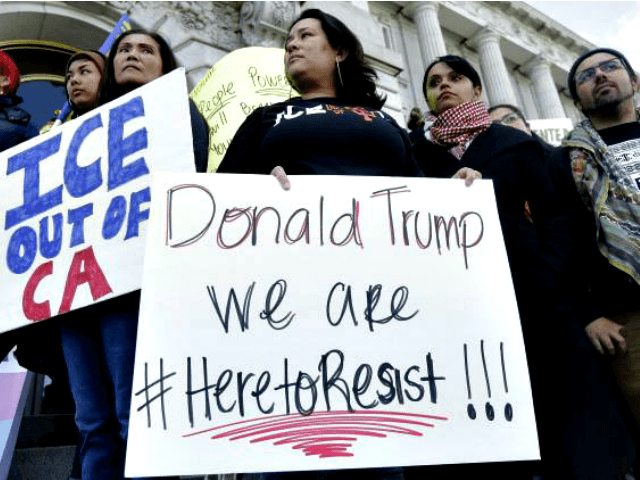Armed with a fresh memorandum from Attorney General Jeff Sessions, the Justice Department is asking District Judge William Orrick to reconsider his decision to block a key “sanctuary city” provision of President Donald Trump’s executive order.
A team of DOJ attorneys moved for leave to file a motion for reconsideration in the same federal court, the U.S. District Court for the Northern District of California in San Francisco, where Judge Orrick issued his preliminary injunction last month blocking enforcement nationwide of section 9(a) of Executive Order on Enhancing Public Safety.
In essence, the government is asking Judge Orrick to have a second look at the need for that broad injunction now that Attorney General Sessions has issued a narrower and more specific interpretation of the section, which commands the withholding of certain federal funds for so-called “sanctuary” jurisdictions that refuse to cooperate with federal immigration enforcement.
Formal opinions by the Attorney General of the United States are binding on the DOJ as the definitive expression of that department’s interpretation of the law. At the first hearing, Orrick heard argument from the government and the plaintiffs in the case, San Francisco and Santa Clara Counties, without the existence of Monday’s memo.
Orrick, in reaching his decision, accepted the plaintiffs’ arguments that the order could be interpreted to mean withdrawing all federal funding of any kind based on a wide variety of practices that frustrate federal immigration enforcement actions. As in the Hawaii v. Trump case dealing with the administration’s travel ban executive order, Judge Orrick relied on political statements made by President Trump and Attorney General Sessions to support his conclusion. “[T]hrough public statements, the President and Attorney General have appeared to endorse the broadest reading of the Order,” the injunction reads.
On Monday, immediately preceding the DOJ attorneys filing of their motion, Attorney General Sessions issued a memo establishing his interpretation of the executive order challenged in the case. According to the memo, the executive order commands only the withholding of the small subset of federal grants that specify compliance with 8 USC § 1373, a federal law which prohibits local governments from preventing their agencies from providing immigration information to the federal government, in their authorizing statutes.
It can not apply, as the plaintiffs argued and the court initially found it could, to all federal funds. Also reiterated is that sanctuary jurisdictions, for the purposes of the executive order and therefore this case, are to be considered only those cities and states which “willfully refuse to comply” with 8 USC § 1373.
The interpretation of Executive Order 13,768 adopted in Sessions’s memo closely tracks what government lawyers argued the executive order meant at the original preliminary hearing. According to the briefing, it is now the government’s hope that the court will consider Monday’s memo a new material fact or change of law and allow DOJ to file a motion for reconsideration.
Should the court grant leave and accept the government’s motion for reconsideration, that motion contends that Attorney General’s memo on the DOJ’s understanding of the executive order will cancel out the concerns that lead to the original injunction.
The thrust of the government’s argument in this round of the litigation is that if, as the government contended at the original oral arguments and Sessions’s memo declares, only a narrow set of behaviors can lead to revocation of funds, and that revocation applies only to a few specific grant programs, the concerns about the executive order that led Judge Orrick to grant an injunction no longer exist. There would, according to the government’s argument, no longer be a substantial likelihood of success for the plaintiff counties at the eventual trial.
The injunction was supported by arguments that the executive order, by potentially taking all a local government’s federal funds, could be an unconstitutional encroachment by the president on Congress’s spending power or be a “coercive” use of federal power against local government in violation of the Tenth Amendment. Another argument was that, by not specifying exactly what constituted a “sanctuary jurisdiction,” the order could be unconstitutionally vague.
According to the motion for reconsideration the government is asking Judge Orrick to accept, Session’s memo decreases the likelihood of success on each of these theories enough to warrant lifting the preliminary injunction.
Should the court grant leave and accept the motion, the plaintiff California counties will have the opportunity to submit a reply brief of their own before Judge Orrick decides whether to modify or vacate his preliminary injunction and allow the executive order to go into effect while this case moves forward. If the injunction is left unmodified, a likely next step is an appeal to the Court of Appeals for the Ninth Circuit.
Regardless of the outcome, Sessions’s memo will govern DOJ practice in distributing their own grants and the department will ask jurisdictions for proof of their compliance with federal immigration law.
The consolidated cases are City of County of San Francisco v. Trump, No. 17-cv-485, and County of Santa Clara v. Trump, No. 17-cv-574.

COMMENTS
Please let us know if you're having issues with commenting.